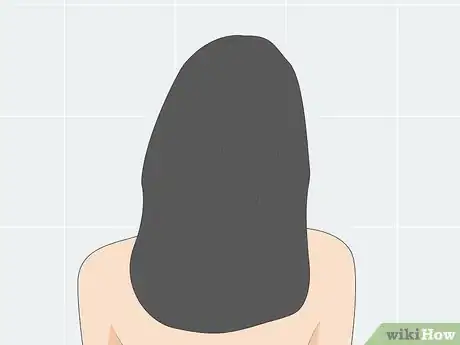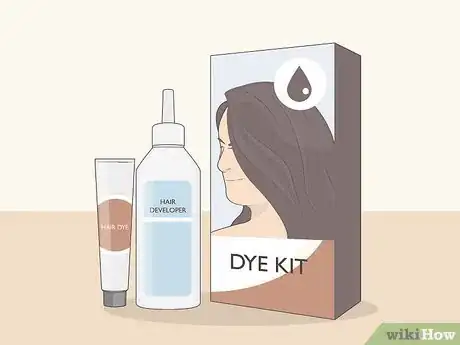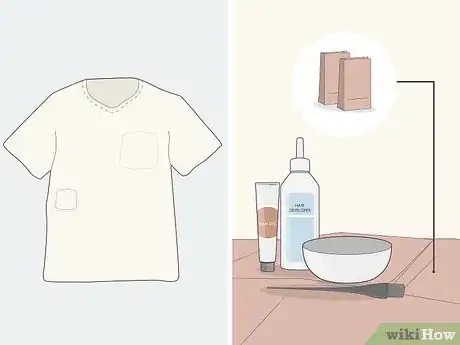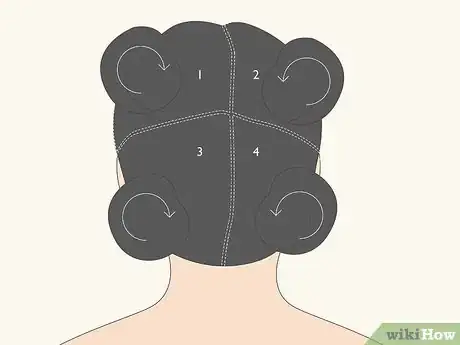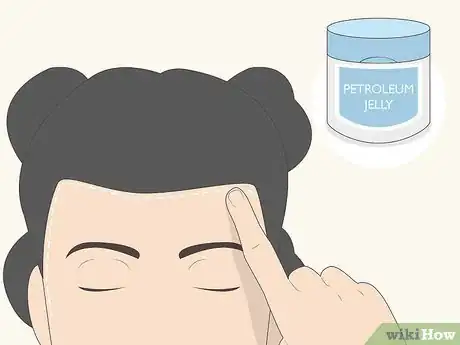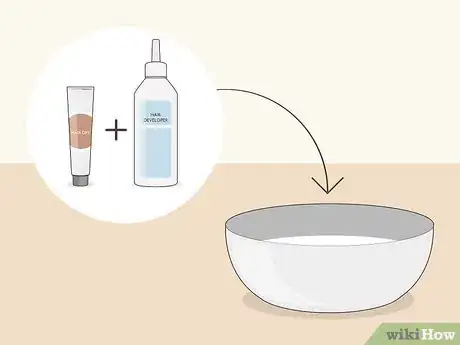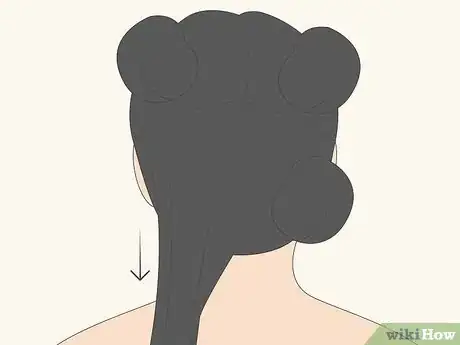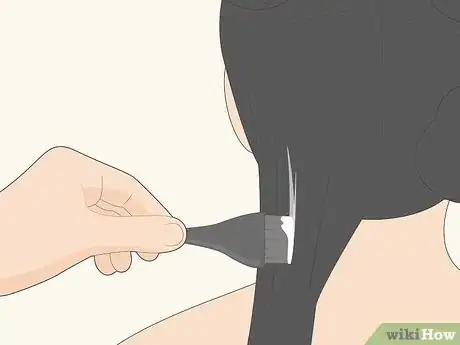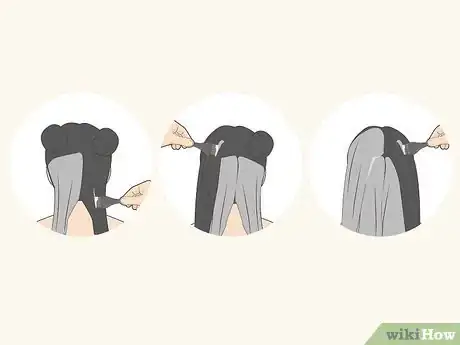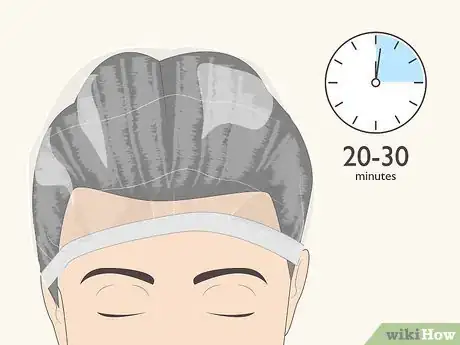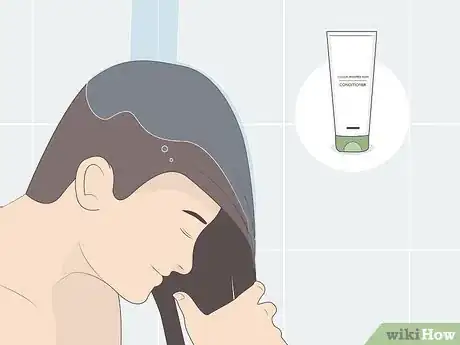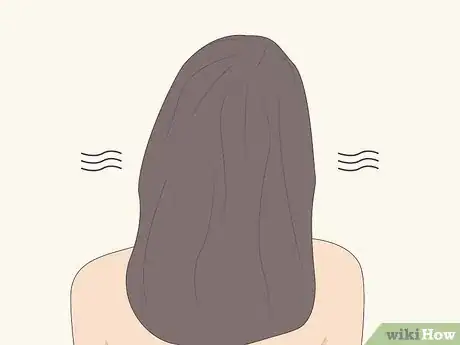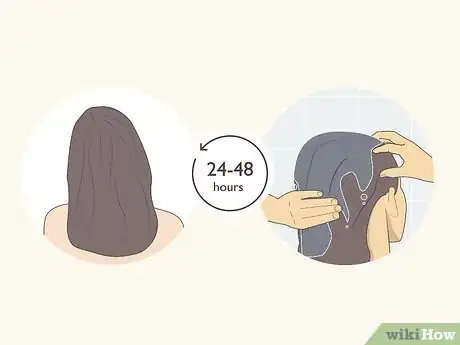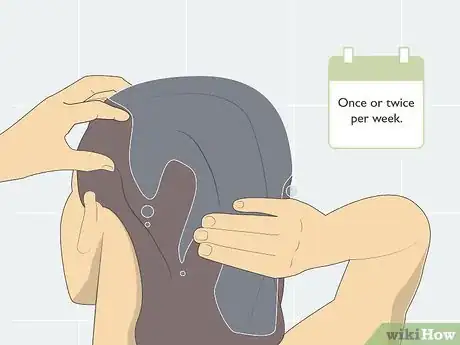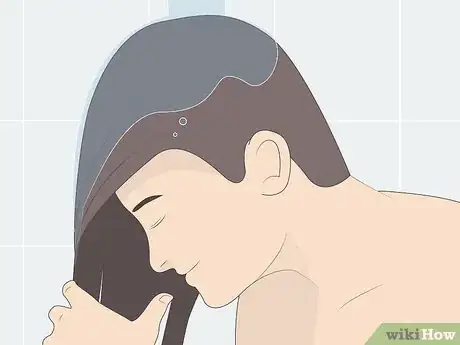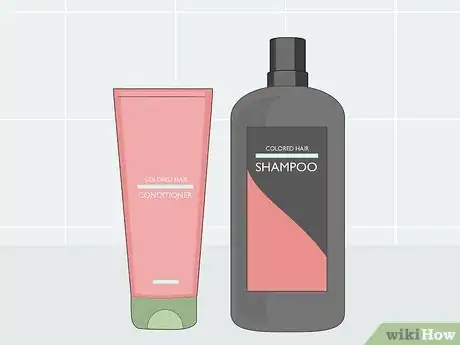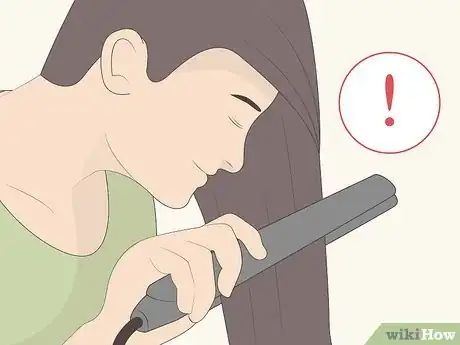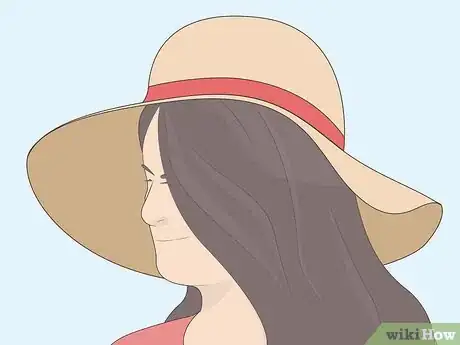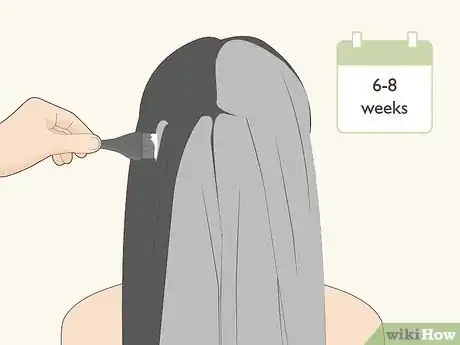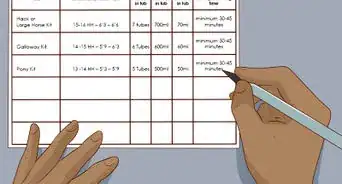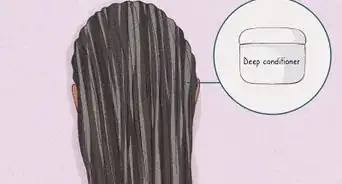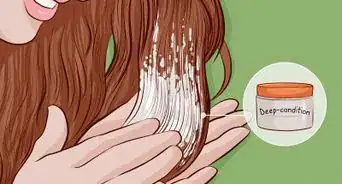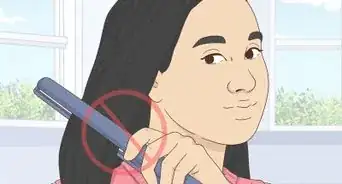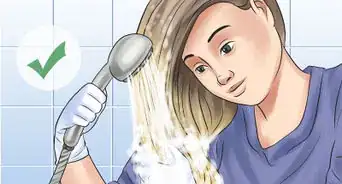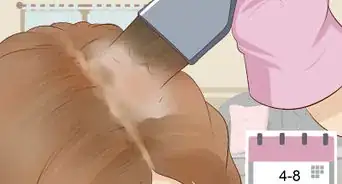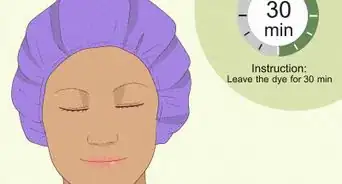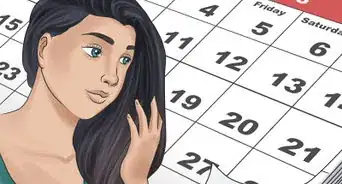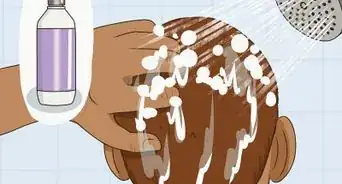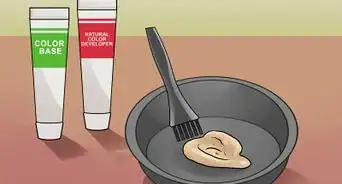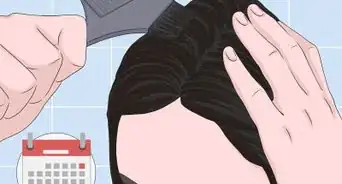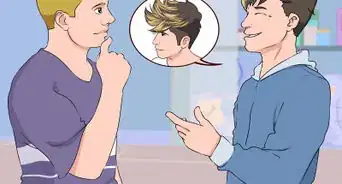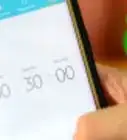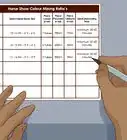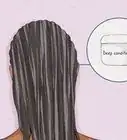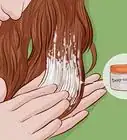This article was co-authored by April Ferri. April Ferri is a Professional Hair Stylist and the Co-Owner of Widows Peak Salon, a hair salon based in Los Angeles, California. With over ten years of experience, April specializes in hair coloring and enhancing and transforming natural tones into vibrant shades for beautiful and low maintenance hair. Her work has been featured in Voyage LA Magazine, and she has worked as a stylist for LA Fashion Week.
There are 19 references cited in this article, which can be found at the bottom of the page.
This article has been viewed 83,785 times.
Dyeing black-colored hair can be tricky because not all hair colors will show up on it. This is because hair is not translucent; it's opaque. With the right products and technique, however, it's possible to dye black hair. Brown is an excellent color choice for black hair because it's natural and not too light (compared to pastel blue, hot pink, blonde, and so forth). Best of all, you don't need to bleach your hair, unless you're going for a really light shade of brown.
Steps
Preparing Your Hair and Dye
-
1Start with dry, unwashed hair. It is much better to work on hair that hasn't been washed for at least 1 day. The natural oils on your hair will not only help protect it against the dye, but they will help the dye stick better as well.
-
2Buy boxed dye kit specially formulated for black or dark-colored hair. Since this type of dye will lighten your hair, look for a brown color that's 1 or 2 shades lighter than your own. You can also use a regular boxed dye kit in either light ash brown or dark ash blonde.[1]Advertisement
-
3Protect your clothing and work station. Put on an old shirt that you won't mind ruining. If you are worried about your counter, cover it with newspaper, paper bags, or plastic bags. Put away anything that might get ruined by accidental splashes or spills.[4]
- If you don't have a shirt to spare, drape an old towel or plastic hair dyeing cape around your shoulders instead.
-
4Divide your hair into 4 sections if it falls past your shoulders. Part your hair down the middle, then drape each half over your shoulder, like making pigtails. Divide each half horizontally at about ear-level, so that you have a top and bottom section. Twist each section into a bun and secure it with a hair clip.[5]
- Make short, thick hair more manageable by dividing it into 6 or 8 mini buns. This is a great option for African American or natural hair.
- If your hair is just a few inches/centimeters long, or even shorter, don't worry about sectioning it. Instead, you can simply apply the dye to your whole head, working it through to make sure that every strand is evenly coated.
-
5Apply petroleum jelly around your hairline, then pull on plastic gloves. Your hairline includes your forehead, temples, sideburns, and nape. It would be a good idea to coat the tips of your ears too. Once you have the petroleum jelly applied, pull on a pair of plastic hair dyeing gloves.[6]
- If you are using a hair dye kit, the gloves should already be inside the box. If you can't find them, pull open the instruction packet; they are usually in there.
- If you're not using a kit, pick up a pair of gloves from the beauty supply store or hair salon. Craft stores may also carry plastic or vinyl gloves for fabric dye.
-
6Mix the dye and developer, then pour it into a plastic bowl. Pour the dye and any included oils into the developer bottle first, then shake the bottle to mix everything together. After that, you can pour the mixture into the mixing bowl.[7]
- Your finished dye should not have any streaks in it. If there are any, stir them out with a plastic spoon, or with the handle of your tinting brush.
- You can leave the dye in the developer bottle if you have very short hair. If your hair is short enough that it did not need to be sectioned, you don't need to pour your dye into a bowl.
- If you are using dark ash blonde dye, consider adding a packet of "color corrector" to reduce brassy tones.[8]
Applying and Rinsing the Dye
-
1Undo 1 of the bottom sections in your hair. Comb the section out so that it is nice and smooth, and free of any knots and tangles. If you have very thick hair, you may even want to divide that section up into 2 or 4 smaller sections.
- Don't worry about this if you didn't section off your hair.
- If you choose to divide the section up further, just twice and pin the smaller sections into mini buns.
-
2Use the tinting brush to apply the dye to your hair. If you are touching up a previous dye job, apply the dye to your roots first, then work your way down to the lighter portion of your hair. If you've never dyed your hair before, however, apply the dye to all your ends first. Then go back and dye apply the dye to your roots. This helps prevent your roots from taking on too much color and becoming "hot roots."[9]
- The heat from your scalp will cause the dye to process faster. If you apply the dye from roots-to-ends, it will lighten too fast at the top.
- If you kept the dye in the kit's bottle, squeeze some out onto your hair, then work it in with your fingers. Comb the section afterwards with a wide-toothed comb.[10]
- You are only applying the dye to the loose section of hair. Don't worry about the other sections.
-
3Undo the next section of hair and repeat the process. Finish the bottom sections first, then do the upper sections last. This is because the heat generated by your scalp will cause the dye to process and lighten faster in those areas.
- You can leave the already-dyed section loose, or you can twist it back up into a bun.
- If you are touching up a previous dye job, apply the dye to your hairline, then work your way down to the ends, or whenever the lighter color starts.
-
4Tuck your hair under a plastic shower cap and wait 20 to 30 minutes. How long you end up waiting depends on the type of developer or kit that you are using. Read the instructions on the bottle or kit to find out how long you should wait. In most cases, however, you will wait around 20 to 30 minutes.[11]
- The shower cap will not only help keep your surroundings clean, but also trap the heat and help the dye process better.[12]
- If you don't have a shower cap, use a plastic bag instead. Secure it with hair clips to trap the heat.
-
5Rinse the dye out with cool water, then apply conditioner to your hair. Do not use hot water or shampoo. Instead, rinse your hair with cool to lukewarm water until the water runs clear. Next, apply conditioner to your hair, wait 2 to 3 minutes, then rinse it out with cool/lukewarm water as well.[13]
- If your kit didn't come with conditioner, use conditioner made for color-treated hair. You can also use a sulfate-free conditioner.
-
6Allow your hair to air dry. If you must use a hairdryer, apply a heat protectant first. It really would be better if you let your hair air dry, however; you hair is fragile after dyeing.
- If your hair still looks brassy after you've dried it, tone it with hair toner.
Caring for Your Hair
-
1
-
2Wash your hair no more than once or twice per week. Your hair really does not need to be washed every day. In fact, the more often you wash your hair, the more dry it will become! Washing it too often will also cause the dye to fade faster.[16]
- If you absolutely must wash your hair, consider co-washing it with just conditioner. You can also use some dry shampoo instead.
-
3Use cool water to wash and rinse your hair. Heat can cause the dye to fade faster; it can also damage your hair and make it look frizzy.[17] Use the coldest temperature that you can stand to wash and rinse your hair.[18]
- Use cool to lukewarm water every time you wash your hair, not just for the initial wash and rinse.
-
4Wash your hair with shampoo and conditioner made for colored hair. Not only will these help the color last longer and keep it from fading, but they will also help nourish it.[19] If you can't find any, stick with sulfate-free products instead.
- Most shampoos and conditioners state on the label if they are "sulfate-free." If the label doesn't say this, check the ingredient label.
- Sulfates are harsh cleaning agents that cause hair to turn dry and brittle. They also cause dye to fade.[20]
- About once or twice per month, consider switching out your conditioner for a deep conditioning mask instead.
-
5Limit the heat styling and use heat protectants when you do. Dyed hair is fragile, so any heat will cause it to become damaged. It will also cause the color to fade. Let your hair air dry whenever possible, and focus on heat-free styling methods instead of using curling irons and flat irons.[21]
- If you must heat-style your hair, apply a heat protectant to it first.
- Make sure that your hair is completely dry before you use a curling iron or flat iron on it.
- Instead of blow drying your hair from start to finish, allow it to air dry about 90% of the way first, then use a hairdryer to finish drying and styling it.
-
6Cover your hair to protect it from sunlight. A hat, scarf, or hood would be ideal. If you don't like wearing things on your head, then use a UV hair spray instead. It is similar to the heat protectant you'd apply before curling or straightening your hair.[22]
- Sunlight can fade your hair color faster. It can also damage your hair.
-
7Retouch your dye job every 6 to 8 weeks. Hair dye is not as damaging as bleach, but it can still ruin your hair if you do it too often. This is especially important when you are going from black to brown, because the dye does lighten your hair to some extent.[23]
- Unless there is significant fading, you don't need to dye your hair all over again; focus on the roots.
Expert Q&A
Did you know you can get expert answers for this article?
Unlock expert answers by supporting wikiHow
-
QuestionCan I dye over black hair without bleaching it?
 April FerriApril Ferri is a Professional Hair Stylist and the Co-Owner of Widows Peak Salon, a hair salon based in Los Angeles, California. With over ten years of experience, April specializes in hair coloring and enhancing and transforming natural tones into vibrant shades for beautiful and low maintenance hair. Her work has been featured in Voyage LA Magazine, and she has worked as a stylist for LA Fashion Week.
April FerriApril Ferri is a Professional Hair Stylist and the Co-Owner of Widows Peak Salon, a hair salon based in Los Angeles, California. With over ten years of experience, April specializes in hair coloring and enhancing and transforming natural tones into vibrant shades for beautiful and low maintenance hair. Her work has been featured in Voyage LA Magazine, and she has worked as a stylist for LA Fashion Week.
Professional Hair Stylist
-
QuestionHow do I strip hair dye?
 April FerriApril Ferri is a Professional Hair Stylist and the Co-Owner of Widows Peak Salon, a hair salon based in Los Angeles, California. With over ten years of experience, April specializes in hair coloring and enhancing and transforming natural tones into vibrant shades for beautiful and low maintenance hair. Her work has been featured in Voyage LA Magazine, and she has worked as a stylist for LA Fashion Week.
April FerriApril Ferri is a Professional Hair Stylist and the Co-Owner of Widows Peak Salon, a hair salon based in Los Angeles, California. With over ten years of experience, April specializes in hair coloring and enhancing and transforming natural tones into vibrant shades for beautiful and low maintenance hair. Her work has been featured in Voyage LA Magazine, and she has worked as a stylist for LA Fashion Week.
Professional Hair Stylist
-
QuestionI've dyed my hair before but that doesn't work. I have black hair. What should I do?
 Community AnswerBleaching it may be your best bet to dye it. Then, you can use whatever color you want.
Community AnswerBleaching it may be your best bet to dye it. Then, you can use whatever color you want.
Things You'll Need
- Boxed dye kit for dark hair
- Plastic mixing bowl
- Hair tinting brush
- Hair clips
- Brush or comb
- Plastic shower cap
- Old shirt, towel, or plastic dyeing cape
- Petroleum jelly
- Shampoo for color-treated hair
- Conditioner for color-treated hair
References
- ↑ https://www.youtube.com/watch?v=SX9sf74w8MM&t=1m27s
- ↑ April Ferri. Professional Hair Stylist. Expert Interview. 8 December 2020.
- ↑ https://www.youtube.com/watch?v=WSg8FU1ZkM8
- ↑ https://www.youtube.com/watch?v=SX9sf74w8MM&t=18s
- ↑ https://www.youtube.com/watch?v=SX9sf74w8MM&t=30s
- ↑ https://www.youtube.com/watch?v=SX9sf74w8MM&t=1m8s
- ↑ https://www.youtube.com/watch?v=SX9sf74w8MM&t=1m52s
- ↑ https://www.youtube.com/watch?v=N4ou75Gnh7k&t=20s
- ↑ https://www.youtube.com/watch?v=SX9sf74w8MM&t=2m20s
- ↑ https://www.youtube.com/watch?v=N4ou75Gnh7k&t=1m30s
- ↑ https://www.youtube.com/watch?v=SX9sf74w8MM&t=3m25s
- ↑ https://www.youtube.com/watch?v=WSg8FU1ZkM8&t=9m42s
- ↑ https://www.youtube.com/watch?v=SX9sf74w8MM&t=3m34s
- ↑ https://www.brit.co/dyed-hair-care/
- ↑ https://www.goodhousekeeping.com/beauty/hair/tips/a25379/ruining-dyed-hair/
- ↑ https://www.elle.com/beauty/hair/news/g29826/colored-hair-tips/
- ↑ April Ferri. Professional Hair Stylist. Expert Interview. 8 December 2020.
- ↑ https://www.brit.co/dyed-hair-care/
- ↑ https://www.goodhousekeeping.com/beauty/hair/tips/a25379/ruining-dyed-hair/
- ↑ April Ferri. Professional Hair Stylist. Expert Interview. 8 December 2020.
- ↑ https://www.goodhousekeeping.com/beauty/hair/tips/a25379/ruining-dyed-hair/
- ↑ https://www.elle.com/beauty/hair/news/g29826/colored-hair-tips/
- ↑ https://www.goodhousekeeping.com/beauty/hair/tips/a25379/ruining-dyed-hair/
- ↑ https://www.elle.com/uk/beauty/hair/articles/g31483/ways-to-add-colour-to-naturally-dark-black-hair/
- ↑ https://www.elle.com/uk/beauty/hair/articles/g31483/ways-to-add-colour-to-naturally-dark-black-hair/
- ↑ https://www.cosmopolitan.com/uk/beauty-hair/hair/a19596609/how-to-lighten-black-hair/
About This Article
If you want to dye black hair brown, buy a dye specifically formulated for dark hair, since these will lighten your hair by 1-2 shades without having to use bleach. Additionally, look for a dye labeled “ash brown” or “ash blond,” which will bring out the cool tones in your hair and keep it from looking too brassy. To get the best results with your dye job, apply your dye to unwashed hair, and allow the dye to sit for 20-30 minutes before rinsing with cool water and applying conditioner. To learn our Beauty reviewer’s tips on maintaining your color, scroll down!
